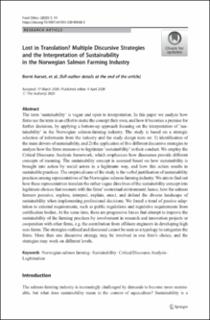Lost in Translation? Multiple Discursive Strategies and the Interpretation of Sustainability in the Norwegian Salmon Farming Industry
Journal article, Peer reviewed
Published version
Permanent lenke
https://hdl.handle.net/11250/2985776Utgivelsesdato
2020Metadata
Vis full innførselSamlinger
- Scientific articles [2181]
Sammendrag
The term ‘sustainability’ is vague and open to interpretation. In this paper we analyze how firms use the term in an effort to make the concept their own, and how it becomes a premise for further decisions, by applying a bottom-up approach focusing on the interpretation of ‘sustainability’ in the Norwegian salmon-farming industry. The study is based on a strategic selection of informants from the industry and the study design rests on: 1) identification of the main drivers of sustainability, and 2) the application of five different discursive strategies to analyze how the firms maneuver to legitimize ‘sustainability’ in their conduct. We employ the Critical Discourse Analysis framework, which emphasizes how discourses provide different concepts of meaning. The sustainability concept is assessed based on how sustainability is brought into action by social actors in a legitimate way, and how this action results in sustainable practices. The empirical case of the study is the verbal justification of sustainability practices among representatives of the Norwegian salmon-farming industry. We aim to find out how these representatives translate the rather vague directives of the sustainability concept into legitimate choices that resonate with the firms’ contextual environment, hence, how the salmon farmers perceive, explore, interpret, explain, enact, and defend the diverse landscape of sustainability when implementing professional decisions. We found a trend of passive adaptation to external requirements, such as public regulations and regulative requirements from certification bodies. At the same time, there are progressive forces that attempt to improve the sustainability of the farming practices by involvement in research and innovation projects or cooperation with other firms, e.g. the contribution from offshore engineers in developing high seas farms. The strategies outlined and discussed cannot be seen as a typology to categorize the firms. More than one discursive strategy may be involved in one firm’s choice, and the strategies may work on different levels.

